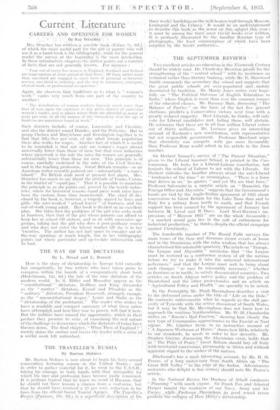• THE SEPTEMBER REVIEWS Two excellent articles on education in
the Nineteenth Century -sliould' be- widely read. Dr. CloudesleY Brereton pleadg for the strengthening of the " central school" with its insistence on t lea] rather than literary training, while Mr.:E. Sherwood Smith commends the secondary day school and suggests that the great public schools are over-populated -anct. unduly dominated by tradition. Mr. Mandy Jones writes very hope- fully on " The Political Outcome of English Education in India," where English is more than ever the common tongue of the educated classes. Mr. Ramsay Muir, discussing. " The Balance of Parties " on the basis of the last five general eleetions;.-prediets. a Conservative victory next time with a great ly reduced Majority. Most Liberals, he thinks, will only vote for Liberal. candidates and, failing them, will abstain.
He est that there are in all four million Liberal voters , out of thirty millions. Mr. Lorimer gives an interesting account of Kashmir's new constitution, with representative - but not responsible governMent. Professor Marchant urges that electricity can compete with gas more favourably titan Professor Bone would udniit in his article in the June number.
Sir Herbert Samuel's surVey of ,`` The Present Situation," given to the Liberal Summer School, is printed in the Con- eininaar y . He looks for a_ Liberal-Labour conciliation, but laments time refusal of Labour to act with the Liberals. Sir Herbert, ridicules the familiar phraSes about the anti-Liberal " tendencies of the time " as meaningless. " There is a force that drives us on," lie quotes, " and yet We are that force." Professor Salvemini in a caustic article on " Mussolini, the Foreign Office and Abyssinia," suggests that the Government's hands are tied by the Ang10-Italian agreement of 1925 about concessions to Great Britain for the Lake Tana darn and to Italy for a railway froM north to south, and that French support has been assured' by the agreement of January last between M. Laval and Il Duce. Lord -Noel-Buxton's im- pressions of " Moscow 1085 " are on the whole favourable : " a marked moral gain lies in the cult of enthusiasm for industrial production," he thinks, despite the official campaign ' ,against Christianity.
Time hundredth number of The Round, hle surveys the main issues of the time and discusses recent events at Ironic and in the Dominions; with the calm wisdOM that has always characterised this admirable quarterly. The'article on " Europe, the League and Abyssinia " maintains,-that -" the League must be restored 'as a conference system of all the nations before we try to make it into the universal international policeman," and that the League ,must seek-to bring about such changes " as may be reasonably necessary," whether in frontiers or in tariffs, to satisfy discontented countries. Two ;articles on South African native policy au(' • the problem of Basutoland and the other protectorates and an article on " Agricultural Policy and Health " are specially to be noted.
In the Fortnightly Mr. Hugh Massingiunii describes- a visit to the distressed areas under the title of " Life on the Dole." He mut raStS unfavourably what lie regardii its •the dull, pas- sivity of' Tyneside with the active discontent ofSouth Wales, but it may be that Mr. Massingham does not know how to approach the cautious Northumbrian. Mr. W. II: Chamberlin writes on " Russia's Red:. Fascism," showing how closely the new type of Communism approximates to the Fascist or Nazi regime. Mr. • Gisinther Stein, in an instructive account of " A .Japanese Workman at Home," shows how litt le,. relatively ‘• to our standards, he needs in order to live •decently. Mr. • Stephen Givynn, discussing the Abyssinian crisis, holds that as " The Priee 'of Peaeci'" Great. Britain should buy off Italy with' territorial concessions, Presumably in Africa and without apparent_ regard. to the -wishes of life 'natives.
Blackwood's. has a most interesting ;teeount, by,Mr. R. 0. Pearse, of a 'long 11161m-I our from South Africa up " The Great Rift Valley " to the edge of the Sudan. dkclVenturous motorists who delight in line scenery.shOuld note Mi'. Pejrse's
article. • . . .
In the National Review the Duchess of Athol' condemns " Planning " with much vigour. Sir Frank Fox and Admiral Harper lament the weakness of our Navy, Army and Air po.reeN while .,iIcofesspr ;H,eartplw.i .good round terms predicts' the collapse off. Ilea s dictatorship.






































 Previous page
Previous page